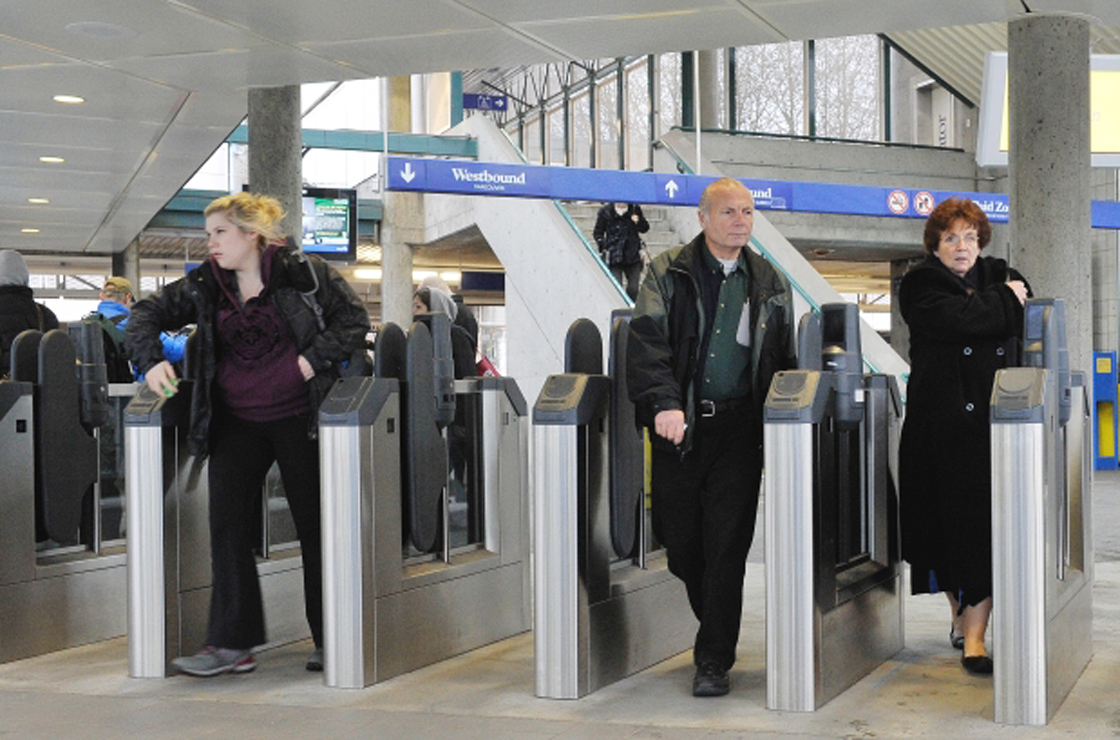TransLink is ending the free ride for employees of a number of agencies as it renegotiates about 40 tariff agreements as it brings in its new automated fare system.

As of April 1, BC Transit employees were no longer able to catch a free lift on TransLink’s network of buses, SkyTrain cars and boats. Off-duty police, fire and rescue personnel will have to start paying as of July 1, as will enforcement officers with the Department of Fisheries and Oceans.
Bob Paddon, a TransLink executive vice-president, said the changes are being made as the transit authority prepares to begin testing this summer of the Compass Card fare system.
“In some cases, there’s some (agreements) we’ve had in the past that we’re just not going to proceed with,” he said. “And, if we’re going to continue with it, to then make arrangements to move to an electronic fare card and (a system) where we’ll have controlled gates on SkyTrain.”
Each of TransLink’s roughly 40 tariff agreements will be dealt with individually, Paddon said, adding more cancellations are a possibility. TransLink wouldn’t supply the full list of organizations that partner with it to receive these free or reduced rates.
The reciprocal arrangement between TransLink and BC Transit, allowing transit staff from either service to ride for free, was not used by many, Paddon said. Neither were the historical arrangements with DFO officers, police and fire department employees.
- ‘It’s just without reason’: Friends, community still reeling after White Rock murder
- Unique simulator helping B.C. aerial firefighting crews prepare for tough summer
- White Rock fatal stabbing suspect and victim may have been in physical altercation: IHIT
- B.C. to ban drug use in all public places in major overhaul of decriminalization
Other agreements — such as a deal with the Canadian National Institute of the Blind — will have to be updated to work with the new system.
“Here’s the complication: any member of CNIB in any part of Canada can ride for free on our system when they’re here, so it’s how do you set it up so that they can get this electronic fare card,” Paddon said.
Meanwhile, TransLink said it was able to eke out an unexpected saving of $7 million in 2012 even after its plan to raise property taxes was roundly rejected by Metro Vancouver’s mayors, according to its 2012 year-end financial report.
The transportation authority “tightened up” its bus service and cut costs by $45 million, which helped compensate for the loss of $60 million in revenue it had planned to reap over 2012 and 2013 from increased property taxes.
“It does show that we were able to tighten our belts, look at different ways of optimizing the business and still maintain a high customer satisfaction,” TransLink chief financial officer Cathy McLay said.
The authority will still have to dip into its reserve fund, which totalled $294 million at the end of last year, to offset the loss of revenues from the rejected tax.
Metro Vancouver mayors refused to increase property taxes after the provincial government last spring shot down proposals for a vehicle levy or for using carbon taxes collected in the region for transit. Apart from provincial and federal subsidies, TransLink’s current funding sources are the levy on gasoline, which is generating less-than-expected revenue, fares and property taxes.
TransLink was able to find savings by switching buses on under-used routes to busier routes, which earned more fare revenue, McLay said. As well, funding from the provincial and federal governments allowed it to overhaul its fleet of buses and subway cars, which cut down on repair costs, she added.
This in turn, reduced waiting times and led to fewer breakdowns and less complaints from TransLink’s ridership, McLay said.
Last December, TransLink’s independent commissioner, Martin Crilly, criticized the transportation service for not factoring these cost-cutting savings into its financial base plan for 2013.
Crilly said that $7-million savings from 2012 should be channelled into transit expansion. If put into bus services, for instance, it would be equivalent to a four-to six-per-cent increase over the current system, he said, or up to 300,000 vehicle-service hours per year.
But TransLink rejected Crilly’s conclusions, saying it will have to draw again from reserves to pay for projects next year and there “remains significant risk” to it financial base plan because of declining fuel-tax revenues.
Metro mayors have been fighting to fund TransLink since its creation in 1999. In 2001, the NDP government scrapped a proposed vehicle levy following a public outcry. No replacement revenue source was provided, leading to a decade of chronic financial shortfalls for TransLink.
In 2009, TransLink again proposed an annual vehicle levy, averaging $122 a vehicle, but that was rejected by then-premier Gordon Campbell. A similar proposal from Metro mayors last year was shot down by Premier Christy Clark.
The 2012 year-end report also stated that ridership had climbed again as the authority provided 363 million rides to customers last year, almost two per cent more than the year before. As well, the Golden Ears Bridge saw a 10-per-cent increase in traffic and a 15-per-cent increase in toll revenues.



Comments